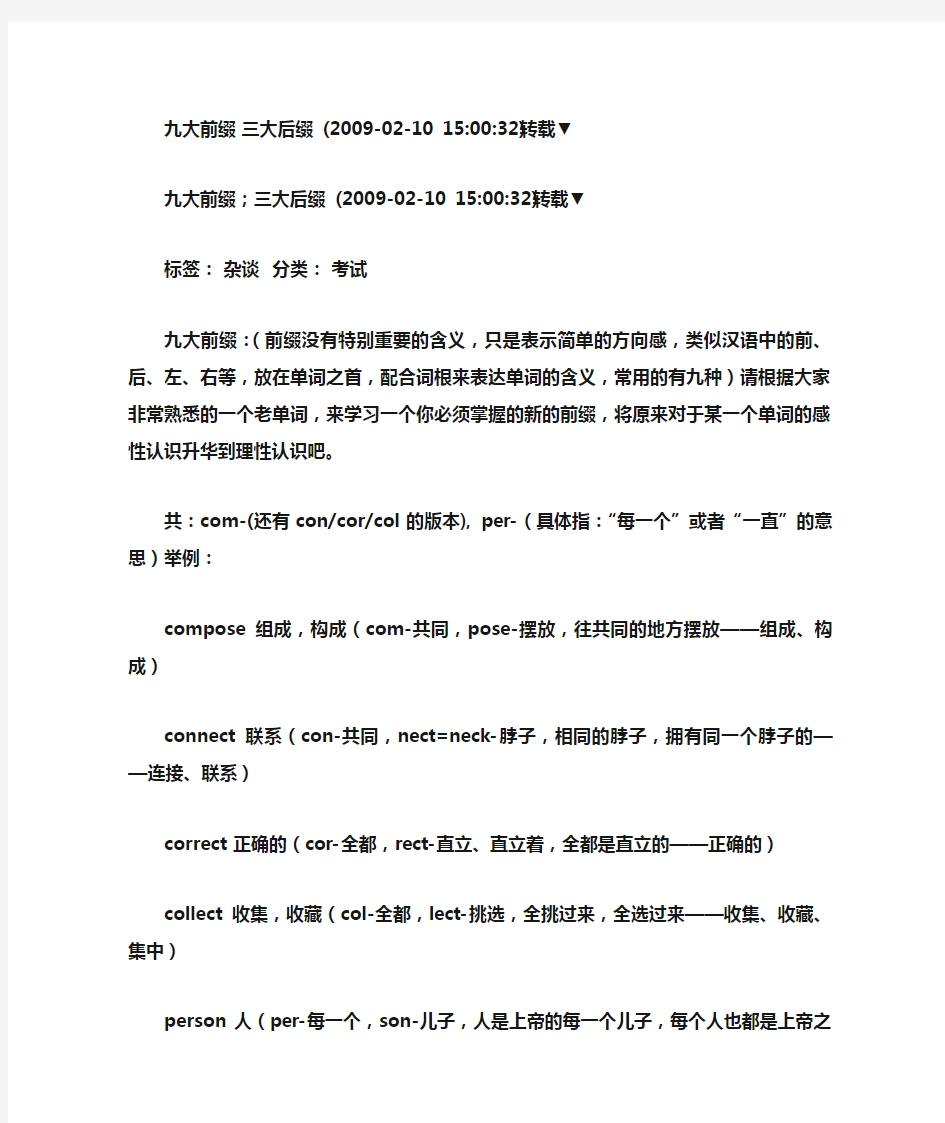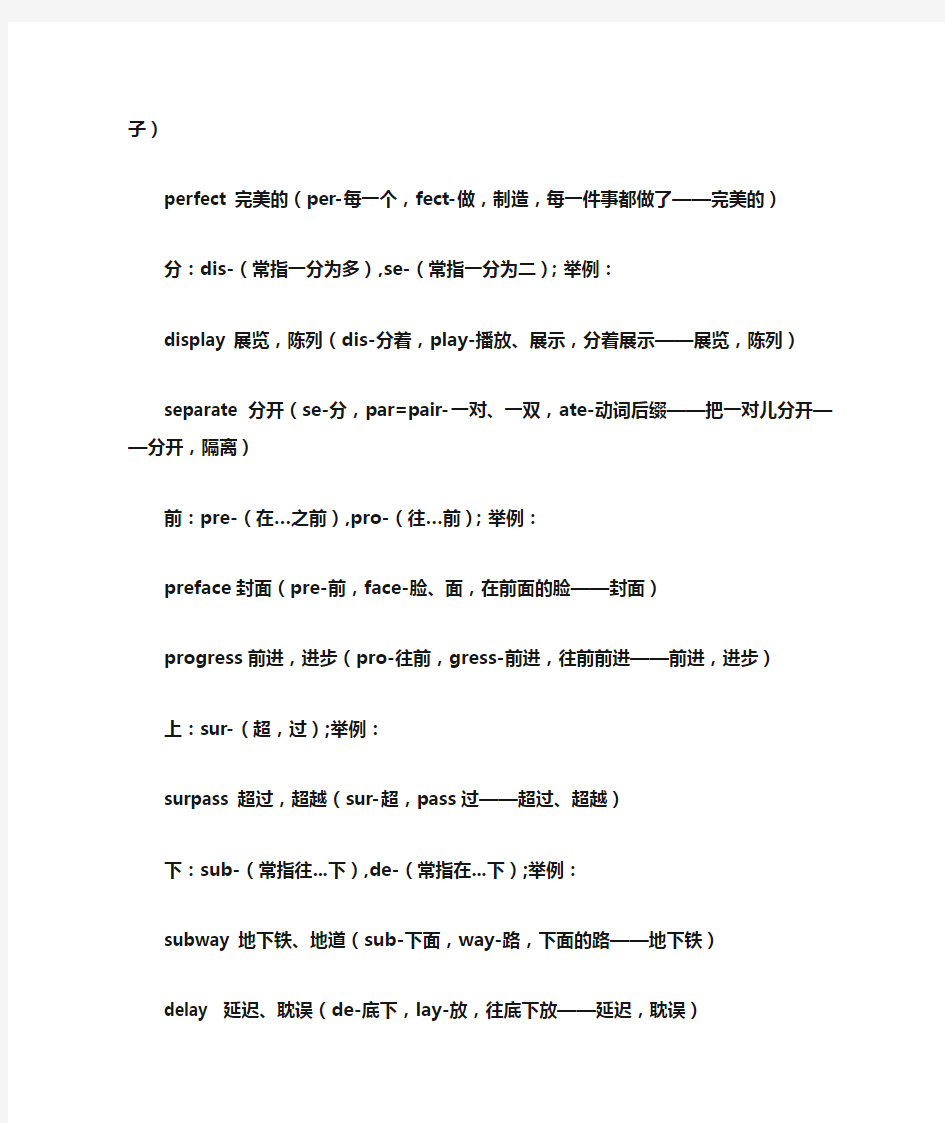九大前缀 三大后缀


九大前缀三大后缀 (2009-02-10 15:00:32)转载▼
九大前缀;三大后缀 (2009-02-10 15:00:32)转载▼
标签:杂谈分类:考试
九大前缀:(前缀没有特别重要的含义,只是表示简单的方向感,类似汉语中的前、后、左、右等,放在单词之首,配合词根来表达单词的含义,常用的有九种)请根据大家非常熟悉的一个老单词,来学习一个你必须掌握的新的前缀,将原来对于某一个单词的感性认识升华到理性认识吧。
共:com-(还有con/cor/col的版本), per-(具体指:“每一个”或者“一直”的意思)举例:
compose 组成,构成(com-共同,pose-摆放,往共同的地方摆放——组成、构成)
connect 联系(con-共同,nect=neck-脖子,相同的脖子,拥有同一个脖子的——连接、联系)
correct 正确的(cor-全都,rect-直立、直立着,全都是直立的——正确的)
collect 收集,收藏(col-全都,lect-挑选,全挑过来,全选过来——收集、收藏、集中)
person 人(per-每一个,son-儿子,人是上帝的每一个儿子,每个人也都是上帝之子)
perfect 完美的(per-每一个,fect-做,制造,每一件事都做了——完美的)
分:dis-(常指一分为多),se-(常指一分为二);举例:
display 展览,陈列(dis-分着,play-播放、展示,分着展示——展览,陈列)
separate 分开(se-分,par=pair-一对、一双,ate-动词后缀——把一对儿分开——分开,隔离)
前:pre-(在…之前),pro-(往…前);举例:
preface封面(pre-前,face-脸、面,在前面的脸——封面)
progress前进,进步(pro-往前,gress-前进,往前前进——前进,进步)
上:sur-(超,过);举例:
surpass 超过,超越(sur-超,pass过——超过、超越)
下:sub-(常指往...下),de-(常指在...下);举例:
subway 地下铁、地道(sub-下面,way-路,下面的路——地下铁)
delay 延迟、耽误(de-底下,lay-放,往底下放——延迟,耽误)
不:a-,ab-, un-,dis-,im-(还有in/il/ir的版本); 举例:
abound 丰富,大量(a-不,bound-板子,边界——无边无际、一望无垠,丰富,富饶)
about 关注、关于、大约(ab-不,out-出去、离开,不出去,不离开——关注、关于、大约)
unhappy 不高兴(un-不,happy-高兴——不高兴)
dislike 不喜欢(dis-不,like-喜欢——不喜欢)
immediately 立即地,直接地(im-不要,med-中间、中间环节,iately-复合的后缀,不要中间环节、一步到位——立即地,直接的)
incorrect 不正确的(in-不,correct-正确的——不正确的)
illegal 不合法的(il-不,leg-词根:law, al-的——非法的)
irregular 不规则的(ir-不,regular-规则的)
内:ac-(常指往...里),in-(常指在...里,也有im/il的版本);
举例:
accept 接受(ac-往里,cept-拿、取,往里面拿——接受)
inside 在里面(in-在里,side-边、侧)
import 进口(im-进入,port-港口)
illuminate 照明(il-进入,lumin-词根:光,ate-动词后缀,进入灯光——照明)外:ex-,e-,es-; 举例:
exit 出口、门(ex-往外,it-后缀,往外出的地方——出口、门)
elect 选举(e-往外,lect-挑选,往外挑选出来——选举)
essay 散文、随笔(es-往外,say-说,随口而说——散文,随笔)
反:re-(有反复、返回两个意思), op-(相对的); 举例:
return返回(re-往回,turn-转,往回转——返回)
oppose对抗(op-相对,pose-摆放——在相对的位置摆放——对抗)
难点两处:
1,dis/ab/re三个前缀是难点,各有两种含义,要重点强化。
2,有的前缀如“com”出现在不同的字母之前,就会有不同的版本,比如“concession迁就,让步/compose组成,作曲/correct正确的/collect收集”,其实这里写单词开头的“com/con/col/cor”都是正宗的前缀“com-共同的”的几个变体,由于前缀的地位不如词根重要,所以在语言使用过程中,前缀最后一个字母根据词根开头的字母作出了牺牲,被同化了。
三种后缀:(后缀更是没有任何实在的含义,只是表示整个单词的词性,类似汉语中的“的、地、得”等,放在单词之后,配合词根和前缀来完成整个单词,常用的具备表示单词词性的后缀有三种)
动词后缀:-ate, -ify, -ise(-ize), -ish. 举例:
dictate 独裁,使…听写(dict-词根:说。“独裁”和“使…听写”的核心含义就是“说”,ate无非是整个单词中表示词性的成分。)
rectify 纠正(rect-词根:直。ify也是一个动词后缀,相当于汉语中的“化”,比如“绿化”、“净化”、“美化”等等后面的“化”字,是一个将形容词转化成动词的符号。)
advertise 做广告(本词上文曾经讲解过。)
finish 完成(fine-词根:终止。比如:final-最后的,al-形容词后缀;finish-完成,ish-动词后缀。)
名词后缀:-a, -ar, -ary, -age, -ance, -ancy, -ant, 举例:
panda 熊猫(pand-词根:膨胀。)
scar 刀疤(sc-词根:雕刻,切割)
salary 薪水(sal=salt-盐,古罗马士兵发盐作为军饷。)
page 一张(辅音字母“p”有强烈的“成张、成片”的含义。)
servant 奴仆(serve-服务 +ant-的人 =servant-奴仆)
-ent, -ence, -ency, -er, -el, -le,举例:
student 学生(study +ent)
fence 击剑、篱笆(f-像竖立的剑的形状)
tendency 趋势、趋向(tend-词根:延伸,伸长)
teacher 教师(teach-教,讲)
panel 仪表盘、面板(pan-词根:盘子)
angle 角度(ang-词根:角度)
-ice, -icy, -ity, -ine, -ion,举例:
police 警察(pole-杆子,柱子)
policy 政策、方针 city 城市
line 线 nation 国家(nat-词根:生)
-or,-ory, 举例:
tailor 裁缝(tail-词根:尾巴,剪刀)
story 故事(st-词根:站着,停留,陈旧的)
-us, -ue, -um, -ute 举例:
campus校园(camp-词根:田野)
dialogue对话(dia-对、彼此,log-说)
museum体育馆 (muse-词根:艺术,艺术品)
minute分钟(mini-词根:小,细小的)
形容词后缀:-al,-ial, -ual, -ant, -ent, -ive, -ite, -ile, -ic, -id,-ous, -ious, -uous 举例:
normal 正常的(norm-标准)
social 社会的(soc-词根:社会)
actual 现实的、现场的(act-行动,动起来的)
giant 巨大的(g-大、广)
deficient 不足的、不够的(de-低,fic-做、制造,ient-的)
native 本地的,本国的(nat-词根:生、长)
polite 文明的、礼貌的(pole-杆子,柱子)
missile 发射的、投射的(miss-词根:投,掷,抛,投)
panic恐慌的(Pan-森林之神)
rigid 僵直的、刻板的(rig-词根:直)
suspicious 怀疑的(su-底下,spic-看,ious-的:在底下偷偷看某人,就是“怀疑的”。)
conspicuous 有目共睹的(con-共同,spic-看,uous-的,大家都看的,有目共睹的)
分享:
14
喜欢
2
赠金笔赠金笔
阅读(3919)┊评论 (1)┊收藏(2) ┊转载(6) ┊喜欢▼┊打印┊举报
已投稿到:排行榜排行榜
前一篇:5500词汇班结班留念
后一篇:常见英文词根总结-1
(完整版)常用前缀后缀
常用前缀后缀 一.表示否定的前缀 1.dis-加在名词、形容词,动词之前。 disadvantage(缺点)dishonorable(不光彩的)disagree(不同意) 2.in-加在形容词,名词之前 incorrect(不正确的),inability(无能,无力),inaccurate(不准确的) 3.im-加在字母m,b,p之前 impossible(不顺能的),impolite(不礼貌的),impudence(厚颜无耻) 4.il-加在以1开头的词前 illegal(非法的),illiterate(文盲的,无文化的)illogical(不合逻辑的) 5.ir-加在以r开头的词前 irregular(不稳定的),irresistable(不可抵抗的),irresolvable(不能分解的,不能解决的) 6.un-加在名词,形容词,副词之前 unfinished(未完成的)undoubted(无疑的)unemployment(失业) 7.non-加在形容词,名词前 non-existence(不存在),non-essential(不主要的),non-electrical(非电的) 8.mis-加在动词、名词之前 misunderstand(误解),misjudge(误判),misleading(误导),misfortune(不幸) 9.de-加在名词,形容词之前 demobilize(遣散;使…复员) decolor (脱色, 漂白) 10.anti-加在名词、形容词之前 anti-Japanese(抗日战争),anti-social(厌恶社会的,反社会的),antidite(解毒药) 11.counter-加在名词、动词前 counterattack(反攻,反击),counteract(抵抗,阻碍)counterrevolution(反革命) 二.表示“前before”的前缀 1.pre- preconception(成见),pre-exsiting(先于……而存在的),pre-selection(选举前的) preface(前言) 2.ante- anteroom(前室,接待室),antecessor(先行者,先驱者) 3.fore- forehaed(前额),foreground(前景),foreman(工头,领班),foresee(预见,先见),foretell(预言) 4.pro- programme(计划),prologue(序幕) 5.ex- ex-president(前任总统)ex-wife(前妻) 三.表示“后-post”的前缀 1.post- post-war(战后),post-position(后置词),postmeridian(下午) 四.表示“低”、“下”的前缀 1.hypo- hypocrisy(伪善,虚伪),hypothesis(假设),pypocholoride(次氯酸盐) 2.Infra- infra-red(红外线),infrahuman(低于人类的),infrasonic(亚声的,次声的) 3.sub- sub-editou(副编辑),sub-way(地铁),sub-conscious(下意识的),submarine(海下的),subtropical(亚热带的),subtitle(副标题)
英语常见前缀后缀68189
英语常见前缀后缀 68189 -CAL-FENGHAI.-(YICAI)-Company One1
前缀 1 a- 加在单词或词根前面, 表示不,无,非 2 a- 加在单词前, 表示在... ..的 3 ab-, abs- 加在词根前,表示离去,相反,变坏等 4 ab-, ac-, ad-, af-, ag-, an-, ap-, ar-, as-, at- 等加在同辅音字母词根前,表示一再等加强意 5 ad- 加在单词或词根前, 表示做....., 加强...... 6 amphi- 表示两个、两种 7 an- 在词根前, 表示不,无 8 ana- 表示错误,在旁边,分开 9 ante- 表示前面,先 10 anti- 表示反对,相反 11 apo- 表示离开,远离 12 auto- 表示自动、自已 13 be- 构成动词,表示使......成为 14 be- 构成一些介词 15 bene- 表示善, 好 16 bi- 表示二个, 两 17 by- 表示在旁边,副的 18 cata- 表示向下,相反,离开 19 circum- 表示环绕,周围 20 co- 表示共同,通常放元音词根前 21 col-, cor- 在同辅音词根前, 表示共同 22 com-, con- 表示共同 23 contra - 表示反对,相反 24 counter - 表示反对,相反 25 de- 表示去掉,变坏,离开,变慢,向下等 26 de- 表示使....成为,加强等 27 deca- 表示十 28 deci- 表示十分之一 29 demi- 表示半 30 di- 表示二个,双 31 di- 表示使...变成,分开,离开
最常见的前缀和后缀
英语中的派生词的构成主要有三种:合成(由两个或两个以上的单词合成的单词);派生(指一个词根加上前缀或后缀构成的单词);转化(一种词性转化成另一种或几种词性的单词)。本文重点通过对前缀和后缀的剖析解读派生词的意义和特点。 先看下表: 一、前缀 1. dis- 表示意义相反,主要用在动词之前,间或用于名词或形容词前。如: appear (v.出现) → disappear (v.消失), 再如: dislike不喜欢 discover 发现 disobey不遵从 disbelieve 不相信 dishonest(adj.)不诚实的 disadvantage (n.) 不利条件,缺点 2. in-, im-, un-, il-, ir-用在形容词前,表示否定意义。如: indirect 间接的 incorrect 不正确的 inactive 不活动的
impossible 不可能的 unable 不能的 unhealthy 不健康的 unsuccessful 不成功的 uncommon不普通的 unpleasant令人不快的 unfortunate不幸的 irregular不规则的 illegal非法的 invisible看不见的 3. re- 表示“重新,再”,用在动词前。如: rebuild 重新建造 recycle 再循环 reconsider 重新考虑 review 复习二、后缀 I.形容词后缀 1. -able (n./v.→adj.)表示“可以……的;显示……性质”。如:respectable 可敬的 eatable 可吃的 comfortable 舒服的 valuable 有价值的 fashionable 时髦的 loveable 可爱的 2. -ful (n./v.→adj.) 表示“充满……的”。如: beautiful 漂亮的 successful 成功的 wonderful 精彩的 mouthful 满嘴的 shameful 可耻的 hopeful 充满希望的 3. -less (n.→adj.) 表示“没有……的”。如: jobless 无业的 cordless 无线的 homeless 无家可归的 helpless 无助的 4. -ous (n.→adj.)表示“具有……性质的”。如: nervous 紧张的 famous 著名的 dangerous 危险的 poisonous 有毒的 mountainous 山区的 humorous 幽默的
构词法-常用英语前缀后缀大全
学点构词法(对扩大词汇量很有帮助喔^^加油) 一. 常见的前缀 1.表示否定意义的前缀 1)纯否定前缀 a-, an-, asymmetry(不对称)anhydrous(无水的) dis-, dishonest, dislike in-, ig-, il-, im-, ir-, incapable(无能力的、不胜任的), inability(无能), ignoble(平民的、卑贱的), impossible, immoral(不道德的), illegal(非法的、非法移民), irregular(不规则的、不合法的) ne-, n-, none, neither, never non-, nonsense neg-, neglect(忽略) un- unable, unemployment(失业) 2)表示错误的意义 male-, mal-, malfunction(故障、发生故障的), maladjustment(失调) mis-, mistake, mislead(误导) pseudo-, pseudonym(假名), pseudoscience(伪科学) 3)表示反动作的意思 de-, defend(防护、防守、辩护), demodulation(解调) dis-, disarm(裁军、解除武装、缓和), disconnect(使分开,拆开) un-, unload, uncover 4)表示相反,相互对立意思 anti-, ant-, antiknock(防震), antiforeign,(排外的) contra-, contre-, contro-, contradiction(矛盾、不一致), contraflow(逆流) counter-, counterreaction(逆反应), counterbalance(平衡、使抵消) ob-, oc-, of-, op-, object, oppose, occupy with-, withdraw(撤回、撤退), withstand(对抗) 2. 表示空间位置,方向关系的前缀 1)a- 表示“在……之上”,“向……” aboard, aside, 2)by- 表示“附近,邻近,边侧” Bypath(侧道), bypass(弯路) 3)circum-, circu-, 表示“周围,环绕,回转” Circumstance(环境), circuit(巡回、绕路) 4)de-, 表示“在下,向下” Descend(下降、突然拜访), degrade(降格,使屈辱) 5)en-, 表示“在内,进入” Encage(把……关起来) 6)ex-, ec-, es-, 表示“外部,外” Exit(出口、离去), eclipse(使……黯然失色), expand(扩张), export(出口) 7)extra-, 表示“额外”
高中英语单词前后缀大全
高中英语单词前后缀大全 前缀 1 a-加在单词或词根前面, 表示不,无,非 2 a-加在单词前, 表示在..., ...的 3 ab-, abs-加在词根前,表示相反,变坏,离去等 4 ab-, ac-, ad-, af-, ag-, an-, ap-, ar-, as-, at-等加在同辅音字母词根前,表示一再等加强意 5 ad-加在单词或词根前, 表示做....., 加强...... 6 amphi-表示两个、两种 7 an-在词根前, 表示不,无 8 ana-表示错误,在旁边,分开 9 ante-表示前面,先 10 anti-表示反对,相反 11 apo-表示离开,远离 12 auto-表示自动、自已 13 be-构成动词,表示使......成为 14 be-构成一些介词 15 bene-表示善, 好 16 bi-表示二个, 两 17 by-表示在旁边,副的 18 cata-表示向下,相反,离开 19 circum-表示环绕,周围 20 co-表示共同,通常放元音词根前 21 col-, cor-在同辅音词根前, 表示共同 22 com-, con-表示共同 23 contra -表示反对,相反 24 counter -表示反对,相反 25 de-表示去掉,变坏,离开,变慢,向下等 26 de-表示使....成为,加强等 27 deca-表示十 28 deci-表示十分之一 29 demi-表示半 30 di-表示二个,双 31 di-表示使...变成,分开,离开 32 dia-表示穿过,二者之间 33 dif-和辅音重复表示不,否定,分开 34 dis-表示不,消失掉 35 dis-表示分开,分离 36 dys-表示坏,不良 37 e-, ef-表示出,出来, 38 em-, en-, 表示进入... 之中,包围 39 em-,en-, 表示使..... 进入状态 40 endo-表示内部 41 epi-表示在...上,在...周围,在...后面 42 eu-表示好,优秀
常用的前缀和后缀
一、常用的前缀和后缀 1、常用前缀 aero-:concerning the air of aircraft plane—aeroplane space—aerospace anti-:against;opposite of nuclear—antinuclear matter—antimatter war—antiwar auto-:of or by oneself biography—autobiography criticism—autocriticism be-:to treat as the stated thing friend—befriend little—belittle bi-:two;twice;double lingual—bilingual cycle—bicycle bio-:concerning living things chemistry—biochemistry sphere—biosphere by-,bye-:less important produce—by-produce way—byway centi-:hundredth part grade—centigrade meter—centimeter co-:together,with author—coauthor exist—coexist col-:( used before l ) together,with location—collocation com-:( used before b,m,p ) together,with
passion—compassion con-:together,with centric—concentric federation—confederation contra-:opposite diction—contradiction natural—contranatural cor-:( used before r ) together,with relate—correlate respond—correspond counter-:opposite act—counteract attack—counterattack cross-:across;going between the stated things and joining them country—crosscountry breed—crossbreed de-:showing an opposite;to remove;to reduce code—decode value—devalue dis-:not;the opposite of advantage—disadvantage agree—disagree honest—dishonest em-:( used before b,m,p ) to cause to become body—embody power—empower en-:to cause to become;to make danger—endanger large—enlarge ex-:former ( and still living ) minister—ex-minister wife—ex-wife
英语中常用的前缀和后缀
英语中常用的前缀和后缀 aero:concerning the air or aircraft plane(飞机)—aeroplane(飞机) space(空间, 间隔)—aerospace(航空宇宙) anti: against;opposite of nuclear([核]核子的)—antinuclear(反对使用核武器的) matter(物质)—antimatter(反物质) war(战争、作战、打仗)—antiwar(反战的, 反对战争的) auto: of or by oneself biography(传记)—autobiography(自传) criticism(批评, 批判)—autocriticism(自我反省, 自我检讨) be:to treat as the stated thing friend(朋友, 助手)—befriend(待人如友, 帮助) little(很少的, 矮小的,很少)—belittle(轻视, 使渺小, 使...显得渺小)bi: two;twice;double lingual(语言的)—bilingual(能说两种语言的) cycle(自行车)—bicycle(脚踏车, 自行车) bio:concerning living things chemistry(化学)—biochemistry(生物化学) sphere(圈子)—biosphere(生物圈) by—:less important product(产品, 产物,)—by-product(副产品, 附加产物) way(路,道路)—byway(小道) centi: hundredth part grade(等级)—centigrade(分为百度的, 百分度的, 摄氏温度的)meter(米)—centimeter(厘米) co: together, with author(作家, 创造者)—coauthor(合著者, 共同执笔者,合著)exist(存在, 生存)—coexist(共存) col:(used before l) together, with location(位置, 场所)—collocation(排列, 配置) com:(used before b, m, p)together, with passion(激情, 热情)—compassion(同情,怜悯)
英语单词常见的前缀和后缀及例词
英语单词常见的前缀和后缀 (1)前缀 ①表示“数量” hemi- hemisphere 半球 semi- semicircle 半圆 mono- monocycle 独轮车 monologue 独白uni- unity 团结 university 综合性大学bi- bicycle 自行车 biweekly 双周刊tri- triangle 三角形 tricycle 三轮车quart- quarter 四分之一 penta- pentagon 五角形 Pentagon 五角大楼cent- century 一百年 percent 百分比kilo- kilometer 千米 kilogram 千克multi- multifunctiona 多功能的 multi-national 多国的pan- Pan-American 泛美的 ②表示“否定” de- decrease 减少 destruction 破坏dis- dishonest 不诚实 disappear 消失in- informal 非正式的 innumerable 无数的mis- mistreat 虐待 mistrust 不信任un- unfriendly 不友好的 unlock 开锁non- nonstop 直达的 nonexistent 不存在的 ③表示“方向,位置” ex- exple 赶出 extract 抽出in- indoor 户内的 include 包括
inter- interview 会见 interact 互相作用 pro- propel 推进 protrude 向前伸出sub- subway 地下铁道 submarine 潜艇 trans- transatlantic 横穿大西洋的 transform 变革 ④表示“程度” extra(o)- extraordinary 非常的 extracurricular 课外的 mini- minibus 小面包车 miniskirt 短裙 out- outnumber 数量超过 outlive 活得更长over- overwork 过度劳累 overcharge 要价过高super- supersonic 超音速 supermarket 超级市场under- underestimate 低估 underdeveloped 不发达的 ⑤表示“时间先后” ex- ex-premier 前总理 ex-husband 前夫 fore- forehead 前额 foresee 预见 mid- midday 正午 midterm 期中 pre- precaution 预防措施 prefix 前缀 post- postpone 推迟 postwar 战后 ⑥表示“方式” anti- antinuclear 反核 antiaircraft 防空 co- coexist 共存 colleague 同事 col- collaborate 合作 collocate 并置 com- compassion 同情 combine 联合
英语中常见词根、前缀及后缀(中文翻译打印版)
英语字根 1.ag=do,act 做,动 2.agri=field 田地,农田(agri也做agro,agr) 3.ann=year年 4.audi=hear听 5.bell=war战争 6.brev=short短 7.ced,ceed,cess=go行走 8.cept=take拿取 9.cid,cis=cut,kill切,杀 10.circ=ring环,圈 11.claim,clam=cry,shout喊叫 12.clar=clear清楚,明白 13.clud=close,shut关闭 14.cogn=known知道 15.cord=heart心 16.corpor=body体 17.cred=believe,trust相信,信任 18.cruc=cross 十字 19.cur=care关心 20.cur,curs,cour,cours=run跑 21.dent=tooth牙齿 22.di=day 日 23.dict=say说 24.dit=give给 25.don=give给 26.du=tow二 27.duc,duct=lead引导 28.ed=eat吃 29.equ=equal等,均,平 30.ev=age年龄,寿命,时代,时期 31.fact=do,make做,作 32.fer=bring,carry带拿 33.flor=flower花34.flu=flow流 35.fus=pour灌,流,倾泄 36.grad=step,go,grade步,走,级 37.gram=write,draw写,画,文字,图形 38.graph=write,records写,画,记录器,图形 39.gress=go,walk 行走 40.habit=dwell居住 41.hibit=hold拿,持 42.hospit=guest客人 43.idio=peculiar,own,private,proper 特殊的,个人的,专有的 44.insul=island岛 45.it=go行走 46.ject=throw投掷 47.juven=young年轻,年少 48.lectchoose,gather选,收 49.lev=raise举,升 50.liber=free自由 51.lingu=language语言 52.liter=letter文字,字母 53.loc=place地方 54.log=speak言,说 55.loqu=speak言,说 56.lun=moon月亮 57.man=dwell,stay居住,停留 58.manu=hand手 59.mar=sea海 60.medi=middle中间 61.memor=memory记忆 62.merg=dip,sink 沉,没 63.migr=remove,move迁移 https://www.360docs.net/doc/a66617653.html,it=soldier兵 65.mini=small,little小 66.mir=wonder惊奇
最常见的前缀和后缀
1 / 5 英语中的派生词的构成主要有三种: 合成(由两个或两个以上的单词合成的单词);派生(指一个词根加上前缀或后缀构成的单词);转化(一种词性转化成另一种或几种词性的单词)。本文重点通过对前缀和后缀的剖析解读派生词的意义和特点。 先看下表: 词缀 特点 类别前缀通常不改 变词性词义词类 agree (v.)→ disagree(v.) 同意→不同意 health (n.)→ healthy (adj.) 健康→健康的 care (n.)→ careless (adj.) 小心→粗心的 意义改变后缀一般改变 2 / 5 词性词义改变不 大, 但否定意义后
缀除外 一、前缀 1. dis-表示意义相反,主要用在动词之前,间或用于名词或形容词前。如: appear (v.出现) →disappear (v.消失), 再如: dislike不喜欢discover发现disobey不遵从disbelieve不相信dishonest(adj.)不诚实的disadvantage (n.)不利条件,缺点2. in-, im-, un-, il-, ir-用在形容词前,表示否定意义。如:indirect间接的incorrect不正确的inactive不活动的impossible不可能的unable不能的unhealthy不健康的unfortunate不幸的irregular不规则的illegal非法的 invisible看不见的 3. re-表示“重新,再”,用在动词前。如: rebuild重新建造recycle再循环reconsider重新考虑review复习二、后缀 I.形容词后缀 1. -able (n./v.→adj.)表示“可以??的;显示??性质”。如:valuable有价值的fashionable时髦的loveable可爱的 3 / 5 2. -ful (n./v.→adj.) 表示“充满??的”。如: beautiful漂亮的successful成功的wonderful精彩的 mouthful满嘴的shameful可耻的hopeful充满希望的
常见英语前后缀汇总
常见英语前缀 a-/an-==no;without;lack,amateur不熟练的,业余的,anonymous匿名的,asocial不好社交的,anechoic消声的,anharmonic不和谐的,anarchism无政府主义,acentric无中心的,amoral非道德性的,asexual无性别的 a-==in;on;at;by;with;to,asleep在熟睡中,ahead向前,在前头,abreast肩并肩地,aside在一边,abed 在床上,abloom开花 a-/an-==加强意义,aloud高声地,aright正确地,awake唤醒,aweary疲倦的,annotate注释,announce宣布,通告 ab-==from;awayfrom,abnormal不正常的,abroad国外的,abuse滥用,absorb吸去,abaxial离开轴心的,abend异常终止 ac-==at;to,或表示加强意义,accustom使习惯,account计算,算帐,accredit信任,accompany陪伴,acclaim欢呼,喝彩,accomplish完成 ad-==to;toward;forward,advice建议,advocate倡导,adjoin临近adjust调整,admixture混杂,adventure冒险 af-==at;to,或表示加强意义,affright震惊,恐惧,affix附加,贴上,affirm肯定,确实 ag-==at;to,或表示加强意义,aggrandize增大,aggravate加重,aggrieve使悲痛 amphi-==两、双,amphicar水陆两用车,amphibian水陆两栖的,amphitheatre两边都可观看的剧场,圆形剧场 ante-==before,antecedent先前的,先行的,antetype先型,原型,anteport前港,外港,anteroom 前室,接待室,antedate比实际早的日期,antestomach前胃 anti-==against,antipathy反感,antifreeze防冻,antiwar反战的,anti-imperlialist反帝的,antiageing 防衰老的,antitank反坦克 ap-==加强或引伸意义,appoint指定,任命,appraise评价,appease平息,绥靖 ap-/apo-==离开,apogee远地点(远离地球之处),apostasy脱党,叛教,aphelion(天文)远日点 ar-==at;to,或表示加强及引伸意义,arrange安排,布置,arrect直立的,arrear在后,拖延 arch-==1)big;chief.2)ancient,archbishop大主教,archaeology考古学,archaic古体的,古风的as==to;forward,assign派出,assent同意,assort分类,assimilate同化,吸收,assure使确信,担保,associate联合,结合 at-==at;to,或表示加强及引伸意义,attrap使入陷阱,attest证明,attract吸引 auto-==self;personally,automation自动化,autograph亲笔,autoalarm自动报警器,autocriticism自我批评,autorotation自动旋转,autobiography自传 be-==makeorcausetobe,befog使迷糊,befit适宜,belittle贬低,befriend以朋友相待,becalm使镇静,befool欺骗,愚弄 be-==加以...,饰以...,用...(做某事),bepowder在...上撒粉,bejewel饰以珠宝,becloud遮蔽 be-==在,beside在...旁,below在...下面,before在...之前 be-==加强及引伸意义,befall降临,发生,bespatter溅污,belaud大加赞扬 bene-==well;good,benign和善的,benevolent乐善好施的,benefit好处,benediction祝福,benefaction恩惠,善行,beneficent行善的 bi-==two,bicycle自行车,bilateral双方,bimonthly双月刊,biweekly双周刊,bicolor两色的,bilingual两种语言的 by-==旁、侧、非正式、副,byroad小路,僻径,bywork业余工作,byname别名,绰号 circu-==around,circulate流通,circumnavigate环球航行,circumspect考虑周到的,circumplanetary 环绕行星的,circumpolar在两极周围的,circumaviate环球飞行
常用前缀和后缀
专升本常用前缀和后缀 1.常用前缀 aero:concerning the air or aircraft plane(飞机)—aeroplane(飞机) space(空间, 间隔)—aerospace(航空宇宙) anti: against;opposite of nuclear([核]核子的)—antinuclear(反对使用核武器的) matter(物质)—antimatter(反物质) war(战争、作战、打仗)—antiwar(反战的, 反对战争的) auto: of or by oneself biography(传记)—autobiography(自传) criticism(批评, 批判)—autocriticism(自我反省, 自我检讨) be:to treat as the stated thing friend(朋友, 助手)—befriend(待人如友, 帮助) little(很少的, 矮小的,很少)—belittle(轻视, 使渺小, 使...显得渺小)bi: two;twice;double lingual(语言的)—bilingual(能说两种语言的) cycle(自行车)—bicycle(脚踏车, 自行车) bio:concerning living things chemistry(化学)—biochemistry(生物化学) sphere(圈子)—biosphere(生物圈) by—:less important product(产品, 产物,)—by-product(副产品, 附加产物) way(路,道路)—byway(小道) centi: hundredth part grade(等级)—centigrade(分为百度的, 百分度的, 摄氏温度的) meter(米)—centimeter(厘米) co: together, with author(作家, 创造者)—coauthor(合著者, 共同执笔者,合著) exist(存在, 生存)—coexist(共存) col used before l) together, with location(位置, 场所)—collocation(排列, 配置) com used before b, m, p)together, with passion(激情, 热情)—compassion(同情,怜悯) con:together, with centric(中心的, 中央的)—concentric(同中心的) federation(同盟, 联邦, 联合, 联盟)—confederation(联邦) contra pposite diction(措辞, 用语, 言语)—contradiction(反驳, 矛盾)
英语常见前缀后缀
英语单词中常见前缀(prefix)和后缀(suffix)大总结 ★1.表示否定意义的前缀 1) 纯否定前缀 a-, an-, asymmetry(不对称), asexual, amoral dis- dishonest, dislike in-, ig-, il-, im-, ir-, incapable, inability, ignoble, impossible, immoral, illegal, irregular ne-, n-, none, neither, never non-, nonsense neg-, neglect un- unable, unemployment 2)表示错误的意义 male-, mal- malfunction, maladjustment(失调,不适应) mis- mistake, mislead, misunderstanding pseudo- pseudonym(假名), pseudoscience 3)表示相反动作的意思 de- defend , decompose dis- disarm, disconnect un-, unload, uncover 4)表示相反,相互对立意思
anti-, ant- antiknock( 防震), antiforeign,(排外的) contra-, contre-, contro-, contradiction counter-, counterreaction, counterbalance ob-, oc-, of-, op- object, oppose, occupy with- withdraw, withstand ★2. 表示空间位置,方向关系的前缀 1)a- 表示“在……之上”,“向……” aboard, aside, 2)by- 表示“附近,邻近,边侧” bypath, bypass(弯路) 3)circum-, circu-, 表示“周围,环绕,回转” circumstance, circus 4)de-, 表示“在下,向下” descend, degrade 5)en-, 表示“在,进入” encage, encamp 6)ex-, ec-, es-, 表示“外部,外” exit, expand, export 7)extra-, 表示“额外” extraction (提取) 8)fore- 表示“在前面” forehead, foreground
医学专业英语前后缀及词根
?a-[无,缺] ▲anemia[贫血] ▲ atonia[无张力] ▲ asymptomatic[无症状的] ▲ amenorrhea[闭经] ?ab-[分离] ▲ abduct [外展] ▲ abscision[切除] ?acou (acu)-[听觉] ▲ acumeter [听力计] ▲ acouophone[助听器] ?acro-[肢端] ▲ acromegaly[肢端肥大症] ▲ acromastitis[乳头炎] ?ad (af, an)-[邻近,向上] ▲ adrenal [肾上腺] ▲ adaxial[近轴的] ▲ annexa[附件] ?-ad[……侧] ▲ ventrad[向腹侧] ▲ cephalad[向头侧] ?adeno-[腺] ▲ adenocyte[腺细胞] ▲ adenoidism[腺体病] ?adipo-[脂肪] ▲ adiposis[肥胖症] ▲ adiponecrosis[脂肪坏死] ?adreno-[肾上腺] ▲ adrenocorticoid[肾上腺皮质激素] ▲ adrenalin[肾上腺素] ▲ adrenal[肾上腺] ?-aemia(emia)[血症] ▲ bacteremia[菌血症] ▲ leukemia[白血病] ?-albi (albino)-[白色] ▲ albumin[白蛋白] ▲ albinism[白化病] ?-algesia[痛觉] ▲hypoalgesia[痛觉减退] ?-algia[痛] ▲arthralgia[关节痛] ▲cephalgia[头痛] ▲neuralgia[神经痛] ?alkali-[碱] ▲alkalosis[碱中毒] ?alveo-[牙槽,小沟] ▲alveolitis[牙槽炎] ▲alveobronchiolitis[支气管肺泡 炎] ?ambi-[复,双] ▲ ambiopia[复视] ▲ ambivert[双重性格] ?ambly-[弱] ▲amblyopia[弱视] ▲amblyaphia[触觉迟钝] ?amylo-[淀粉] ▲amyloidosis[淀粉酶] ▲amylase[淀粉酶] ?angio-[血管] ▲angiography[血管造影术] ▲angioedema[血管性水肿] ▲angeitis[脉管炎] ▲angiofibroma[血管纤维瘤] ?ante-[前] ▲antenatal[出生前的] ▲anteflexion[前屈] ?antero-[前] ▲anterolateral[前侧壁] ▲anteroventral[前腹侧] ?anti-[抗,反] ▲antibiotics[抗生素] ▲antihypertensives[降压药] ▲anticoagulant[抗凝剂] ?rarchno-[蛛网膜] ▲arachnoiditis[蛛网膜炎] ?archo-[肛门,直肠] ▲archorrhagia[肛门出血] ▲archosyrinx[直肠灌注器] ?arterio-[动脉] ▲arteriospasm[动脉痉挛] ▲arteriosclerosis[动脉硬化] ?arthro-[关节] ▲arthrocentesis[关节穿刺] ▲arthrotomy[关节切开术] ▲arthritis[关节炎] ?-ase[酶] ▲oxidase[氧化酶] ▲proteinase[蛋白酶] ?-asthenia[无力] ▲myasthenia[肌无力] ▲neurasthenia[神经衰弱] ?audio(audito)-[听力] ▲audiology[听觉学] ▲audiometer[听力计] ?auto-[自己] ▲autoimmune[自身免疫] ▲auto hemotherapy[自体血疗法] ?bacilli-[杆菌] ▲bacillosis[杆菌病] ▲bacilluria[杆菌尿]医学全 在.线提供 ?bacterio-[细菌] ▲bacteriology[细菌学] ▲bactericide[杀菌剂] ?baro-[压力] ▲barometer [压力计] ▲baroreceptor[压力感受器] ?bary-[迟钝] ▲barylalia[言语不清] ▲baryacusia[听觉迟钝] ?bi-[双] ▲bicuspid[二尖瓣]] ▲bilateral[两侧的] ?bili-[胆汁] ▲bilirubin[胆红素] ?bio-[生命] ▲biology[生物学] ▲biopsy[活检] ?-blast[母细胞] ▲spermatoblast[精子细胞] ▲melanoblast[成黑色素细胞] ▲osteoblast[成骨细胞] ?brachy-[短] ▲brachypnea[气短] ▲brachydactylia[短指畸形] ?brady-[迟缓] ▲bradycardia[心动过缓] ▲bradypsychia[精神不振] ?broncho-[支气管] ▲bronchoscopy[支气管镜检查] ▲bronchiostenosis[支气管痉挛]
常见前缀和后缀
考研英语常见前缀和后缀 掌握一些英语构词法,对单词的记忆和理解有很大的帮助,下面列举一些常用的词缀和词根。 一. 常见的前缀 1.表示否定意义的前缀 1)纯否定前缀 a-, an-: asymmetry(不对称)anhydrous(无水的) dis- : dishonest, dislike in-, ig-, il, im, ir : incapable, inability, ignoble(卑鄙的) impossible, immoral, illegal, irregular(不规则的) ne-, n-: none, neither, never
non-: nonsense neg-: neglect un- unable: unemployment 2)表示错误的意义 male-, mal-: malfunctio(故障)maladjustment(失调) mis-: mistake, mislead pseudo-:假的, pseudonym(假名) pseudoscience(伪科学) 3)表示反动作的意思 de-: defend(辩护)demodulation(解调) dis-: disarm, disconnect un-: unload(卸), uncover(揭露)4)表示相反,相互对立意思
anti-, ant-: antiknock( 防震), antiforeign,(排外的) contra-, contre-, contro-: contradiction, controflow(逆流) counter-: counterreaction(逆反应)counterbalance(平衡力,抵消) ob-, oc-, of-, op-: object, oppose, occupy with-: withdraw(撤退,收回)withstand(抵挡,反抗) 2. 表示空间位置,方向关系的前缀1)a- 表示“在……之上”,“向……”aboard, 在……之上(飞机,船,火车) aside离开,旁边,在……旁边
